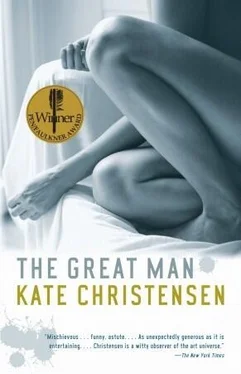“Well, it better be,” said Ralph. “It’s so hot today, you can hardly breathe out there. I came from Brooklyn on the subway.”
“Well, I came in a taxi, and the guy drove like a bat out of hell. I was lucky to get here alive.”
Ralph laughed. One of the willowy waiters stepped over and proffered one-page menus, elegant mottled cream-colored cardboard on which a very few dishes were listed in careful calligraphy and described in painstaking detail. The prices almost gave Abigail a coronary, although of course she could afford this; she could afford anything. Ralph ordered a bottle of sauvignon blanc. Abigail asked for sparkling water. The waiter wordlessly inclined his head, eyes lowered. He was a sloe-eyed, pale Pre-Raphaelite beauty with a mole by his lush lower lip and a lock of curly dark hair on his forehead. Abigail took him in, then looked back down at her menu; his beauty had been created to appeal to a sex different from hers.
“Will you have some of the wine?” Ralph asked her.
“Oh,” said Abigail, about to say no. “I’d love some.”
“Two glasses, please,” said Ralph.
The waiter went away; there were only a few other diners, and the room was so small, Abigail could have heard everyone’s conversation if she’d tried. The whole restaurant was about the size of her bedroom. A moment later, the waiter was back with a bottle of wine in a bucket of ice. He set about uncorking, pouring a smidge into one glass, waiting for Ralph to taste, then pouring for real; then he held up his pad and waited interrogatively; Ralph asked for the fresh pea soup and the cockle salad. Abigail deliberated aloud a moment. Trout meunière was such a classic, dependable dish, and you hardly ever saw it anymore, not that she went out to many restaurants anyway, but that cockle salad sounded so intriguing — it came with asparagus, her favorite, and a mango salsa, which she wasn’t familiar with, but she loved mango.
“Do the cockles come in their shells?” she asked the waiter. “Cockles are those little clamlike things, aren’t they?”
“They’re taken from their shells, rolled in buttermilk, dredged in cornmeal, then lightly fried,” said the waiter. “It’s one of our most popular dishes.”
“Oh,” said Abigail with lust; there was something about the word dredged.
“Have both,” said Ralph.
“All right,” she said, surprised but not at all put off at his familiarity. Very rarely, this happened when she met people; she felt as if they somehow already knew each other, and finding out the details and filling in the blanks was just a formality.
“Excellent choice,” said the waiter, collecting the menus. Ralph smiled up at him and the two men exchanged a quick look.
“I have been thinking a lot as I research this book,” said Ralph to Abigail when the waiter was gone again, “about magnificence.” His tone was earnest and ruminating, as if she had asked him a question and he had been mulling over his answer. “Oscar’s work immediately appealed to me as an adolescent, when I first saw it, because, whatever flaws it may have, whatever limitations, his work has real magnificence — meaning grandeur, beauty, and passion all together.”
“Well,” said Abigail, “he would have liked to hear that.” She drank some wine. It was fizzy and metallic-tasting, with a strange, fishy aftertaste; she didn’t care for it at all. Disappointed, she took another sip to make sure.
“I watched him paint our housekeeper,” she said. “She stripped naked right there in our living room one day after lunch and he got out his paints. Mercy, he called it.”
“ Mercy and Helena were the paintings I first saw of his,” said Ralph with hushed excitement. “What was the real-life Mercy like?”
“Her name was Maribelle. She was one of my best and dearest friends. She lived with us for many years and died shortly after Oscar. Well, I thought he didn’t do her justice at all in that painting! He missed the point of her, I thought. She was so much smarter than I ever was. We would talk about everything, she and I. He painted her as a singer. Is that not a cliché, a black woman singing?”
“What isn’t a cliché about black people when you get down to it?” Ralph said.
“She and I discussed religion, politics, art. We went through the radical age together, she and I, a housewife and a housekeeper. We sat in that apartment like two gerbils in a cage and we read the newspaper and listened to the radio and we discussed everything. We read Ms. magazine from the very first issue. We wanted to go to the big demonstrations, but we felt too self-conscious; we worried we’d get laughed at by the real protestors. But that didn’t mean we weren’t aware! We heard about other women having consciousness-raising groups. We weren’t that formal about it, but we had our own sort of ongoing discussion group, Maribelle and I. And Maxine would come over, of course. She really spiced up the conversation. Her life was so different from ours.”
“Oscar must have been there a lot of the time, too. What did he make of all this?”
“We waited on him and didn’t rock any boats. It never occurred to me to try to change anything in my own life. But oh, I admired those women who just left their husbands and went off on their own! A lot of them with children, to graduate school and into the work world! Maribelle was one of them, but she never saw herself that way.”
“Did she sing a lot?”
“Only around the house. Ethan liked her voice.”
“So it wasn’t out of the blue for him to paint her singing.”
“Oh no! She was singing while she was posing for him.”
“Then how did he miss the point of her?”
She picked up her wineglass and said abruptly, “Is this wine supposed to be so fizzy?”
Ralph swirled the wine around in his glass very fast, keeping the glass on the table, then lifted it to his mouth and inhaled before he tasted it. “It tastes excellent,” he said, puzzled. “Spot-on, in fact.”
“Oh,” she said. She took another sip, determined to choke it down and not look like a schnook. “He missed the point of her,” she said, “because he didn’t really know her. He didn’t take the trouble to know her. Not out of racism, but because to him, it must have been like when he painted me, and why I didn’t let him paint me after a couple of times. The way he looked at you while he was painting you…”
Ralph compressed his lips uncomfortably, glanced down at the napkin in his lap, then looked up at Abigail again. “How was that?” he asked patiently.
“As if he were using you for his own ends,” Abigail replied shortly, having strongly sensed Ralph’s distaste for this topic. She sighed and tried another sip of wine. It tasted exactly as horrible as it had on her first sip. Well, the food would arrive soon, and then she could busy herself with a good lunch.
“But he was famous for not doing that,” said Ralph.
“Well, of course,” said Abigail, immediately regretting having said anything negative about Oscar, the way they’d all agreed they wouldn’t. It was funny, the way she felt so loyal and loving toward him in her heart but came out with critical-sounding things when the biographers started asking about him. “That’s right. I don’t know why I felt that way. Maybe it was all in my head. And also, he was my husband. It was probably very different to model for him if you didn’t know him that well. Are you a painter?”
“No,” said Ralph, “not at all. Just a writer and an appreciator.”
“You have a degree in art history, I think you said?”
“A master’s,” he said modestly, “from Columbia, and I’m thinking of going back for my Ph.D. I’d like to be a college professor, ultimately.”
Читать дальше












